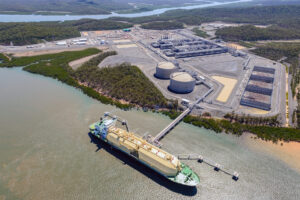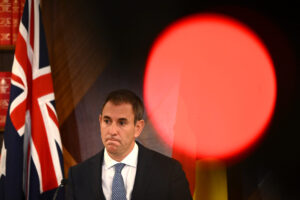Prime Minister Scott Morrison’s repeated offer to deploy troops to help control people’s movements in Sydney’s lockdown areas has found acceptance – not by Gladys Berejiklian, but by NSW Police Commissioner Mick Fuller. The commissioner likes a bit of fear in the community, and with a couple of regiments of soldiers in cams, he’ll have it.

Many in the lockdown communities come from countries where the citizens want protection from the military, not by them. This didn’t work so well in Melbourne last year. Why would anyone think it’s going to work in Sydney?
Community resentment will outlast even the Delta variant. If the police need supplementation, why not enlist Sydney’s parking inspectors or parks rangers? They all wear uniforms, right?
This all seems to be part of a stealth operation to securitise major domestic policy problems and to militarise public policy management. In military parlance, we could call it Operation Khaki Creep. But we should ask ourselves whether securitising refugee policy and management, the consequences of global warming (such as the January 2020 bushfires) and most recently the national response to the pandemic makes for good public policy and good public administration.
It appears that Morrison and Fuller are working from former prime minister John Howard’s playbook. The Howard government appointed a major general as operational commander of the Northern Territory Emergency Response that resulted from the Little Children are Sacred report into child sexual abuse in the NT. It was a heavy-handed and socially divisive response to a community and social issue that demanded sensitivity rather than security.
In Howard’s time, two generals found themselves appointed to senior public service roles in the Department of the Prime Minister and Cabinet, apparently to afford them some “policy experience” before assuming higher military command. They were both outstanding military officers.
But that’s not the point: excellence in the military art does not of itself substantiate a claim to excellence in co-ordinating broad national security advice to the government. Of course, if prime ministers are looking for people who are unfailingly courteous, deferential and obedient, that is what the military leadership system is good at producing.

CREDIT:ALEX ELLINGHAUSEN
Operation Sovereign Borders remains Australia’s refugee management program, transforming the plight of people fleeing oppression into a national security threat and designating border protection rather than humanitarian welfare as the central policy issue. That is what securitisation does: it transforms societal issues into security threats.
Operation Sovereign Borders is the linear descendent of the MV Tampa incident in 2001, when “special forces” were instructed to board a commercial cargo vessel to prevent refugees, rescued from unseaworthy vessels under international Safety of Life at Sea protocols, from landing in Australia.
The January 2020 bushfires in eastern Australia found the Commonwealth government flatfooted in delivering a co-ordinated national response. The political pressure on Morrison – holidaying in Hawaii with his family – intensified as the government’s response was widely seen as inept. What to do? Call out the military. So, we were treated to the spectacle of serried ranks of uniforms respectfully attendant upon the Prime Minister and the Defence Minister as the Australian Defence Force was mobilised to rescue people from the beaches and fight fires. It seems that the trick is: when things are going badly, securitise them. Khaki Creep becomes Khaki Control.
And we have Operation COVID Shield to deliver a vaccine rollout in response to the coronavirus pandemic. A Royal Australian Navy commodore was appointed in April 2021 to manage the logistics of the vaccine rollout, but compounding political pressures demanded a ramping-up of Khaki Control. A lieutenant general (same rank as the Chief of Army), a respected infantry officer with no logistics experience worth mentioning, resplendent however in his khaki uniform and ribbons, runs televised meetings on how to roll out vaccines we do not yet have. It’s theatre. It’s also absurd.
At the same time, the past few weeks have seen Operation Khaki Creep extend into the public service, with the appointment of a (reserve) major general, with no foreign policy background, as secretary of the Department of Foreign Affairs and Trade, and the promotion of a former vice admiral, also lacking relevant expertise, as secretary of the Department of Social Security. And down at the Department of Veterans Affairs, another retired major general oversees delivering welfare benefits to injured service personnel.
Perhaps the day is coming when the ADF, an all-volunteer force recruited from the community that it is designed to protect in time of war, is embedded in the day-to-day management of all the social policy issues that governments fail to address effectively. Then we can all wear cams to work.
Between the Lines Newsletter
The biggest stories and the best analysis from the team at the Australia Institute, delivered to your inbox every fortnight.
You might also like
Stage 3 Better – Revenue Summit 2023
Presented to the Australia Institute’s Revenue Summit 2023, Greg Jericho’s address, “Stage 3 Better” outlines an exciting opportunity for the government to gain electoral ground and deliver better, fairer tax cuts for more Australians.
Who cares about national security?
In parliament last week, responding to the temporary blocking of a legislative favour to Santos, Foreign Minister Penny Wong berated the opposition. The bill – which did eventually pass – is designed to facilitate massive expansion of the gas industry.
18 Reasons why the Stage 3 tax cuts should be redesigned
Australia Institute research shows the Stage 3 income tax cuts are fiscally irresponsible, massively expensive and completely unfair.


